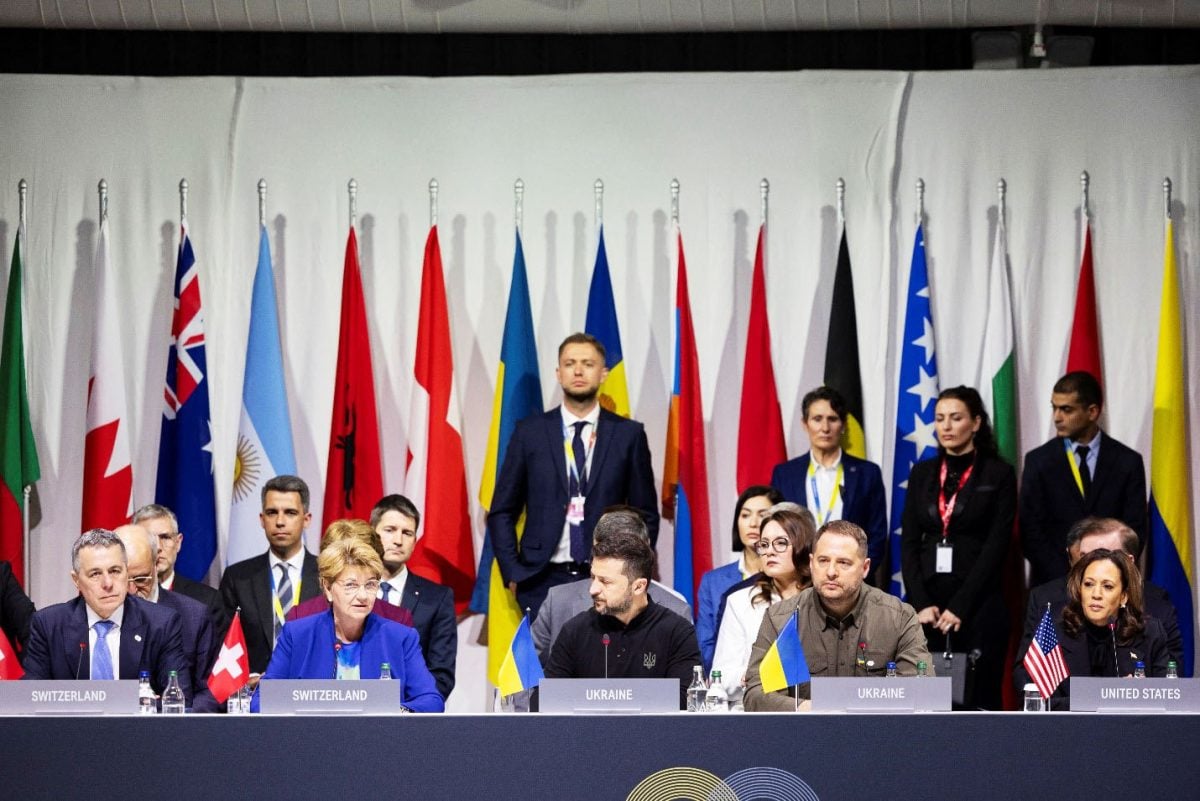BUERGENSTOCK, Switzerland, (Reuters) – World leaders gathered at a Swiss Alpine resort yesterday to seek broader consensus for Ukraine’s peace proposals at a summit shunned by China and dismissed as a waste of time by Russia, which pushed its own rival ceasefire plans from afar.
More than 90 countries took part, but China’s absence in particular dimmed hopes the summit would show Russia as globally isolated, while recent military reverses have put Kyiv on the back foot. The war in Gaza between Israel and Hamas has also diverted the world’s attention from Ukraine.
The talks focused on broader concerns triggered by the war, such as food and nuclear security. But Turkey and Saudi Arabia, both mooted hosts for another such event, said meaningful progress required Russia’s participation.
A draft of a final summit declaration, seen by Reuters, blames Russia’s “war” in Ukraine for causing “large-scale human suffering and destruction” and urges Ukraine’s territorial integrity to be respected.
The document, dated June 13, also calls for Kyiv to regain control of the Zaporizhzhia nuclear power plant and access to its sea ports. The draft had deleted an earlier reference to Russian “aggression” where “war” is cited.
Ukrainian President Volodymyr Zelenskiy trumpeted the summit’s attendance as a success and predicted “history being made.”
“Today is the day when the world begins to bring a just peace closer,” he told leaders assembled around a giant rectangular table.
U.S. President Joe Biden sent his deputy Kamala Harris to represent him – a decision that had riled Kyiv.
Harris announced more than $1.5 billion in energy and humanitarian aid for Ukraine, where infrastructure has been pounded by Russian airstrikes since the 2022 full-scale invasion.
On the eve of the summit, Russian President Vladimir Putin said Russia would end the war if Kyiv agreed to drop its NATO ambitions and hand over four provinces claimed by Moscow. The conditions apparently reflected Moscow’s growing confidence its forces have the upper hand.
But they were swiftly rejected by Ukraine and its allies.
“He’s calling for surrender,” Harris said, adding: “Let nothing about the end of this war be decided without Ukraine.”
“Freezing the conflict today, with foreign troops occupying Ukrainian land, is not the answer. It is a recipe for future wars of aggression,” added European Commission President Ursula von der Leyen.
China said it would boycott the event after Russia was frozen out of the process, with the U.S. suggesting Beijing’s decision was taken at Moscow’s behest.
“Putin has no interest in a genuine peace,” said British Prime Minister Rishi Sunak.
“He has launched a sustained diplomatic campaign against this summit ordering countries to stay away, spinning a phoney narrative about his willingness to negotiate.”
Avoiding some of the most difficult issues, German Chancellor Olaf Scholz compared the summit to “a small plant that needs watering, nurturing and delicate care” that would yield results further down the line.
But countries including Turkey, Saudi Arabia and Kenya noted Russia’s absence as a hurdle.
“I must also note that this summit could have been more result-oriented if the other party to the conflict, Russia, was present in the room,” said Turkey’s foreign minister, Hakan Fidan.
Saudi Arabia’s Foreign Minister Prince Faisal bin Farhan Al Saud said credible talks would involve “difficult compromise”.
Austrian Chancellor Karl Nehammer saw an opportunity to start building a broader global consensus to pressure Russia.
“It’s like we’re in a Western echo
chamber. That is: all Western European countries, the USA, we agree on what we want to happen with Ukraine,” Nehammer said. “But that alone is not enough.”
Calls for Russia to be at the table will only get stronger over time, said Bob Deen, senior research fellow at the Netherlands-based Clingendael Institute think-tank.
“There is a risk that if Ukraine waits too long, it might end up with rival formats popping up. It may risk losing the initiative,” Deen told a forum on the summit’s sidelines.
Supporters of Ukraine marked the talks with a series of events in the nearby city of Lucerne to draw attention to the war’s humanitarian costs.
Dozens of Ukrainian refugees from choirs around Switzerland converged in a public square to sing Beethoven’s “Ode to Joy.”
Earlier about 250 people gathered in the centre of the city, many wrapped in Ukrainian flags, wearing traditional clothes and carrying pictures of missing brothers, husbands or sons as they shared their stories.
“I’m clinging to the idea that my husband is still alive,” said Svitlana Bilous, the wife of a soldier who has been missing for more than 14 months. “That’s what keeps me going.”









